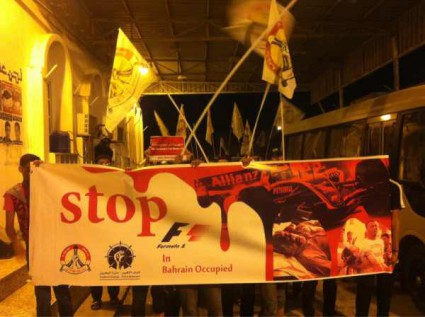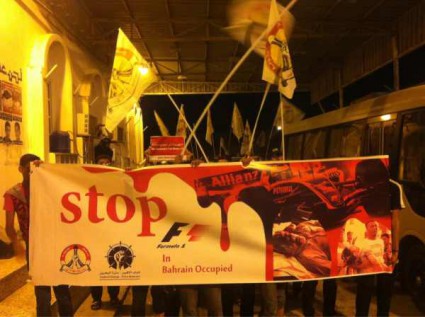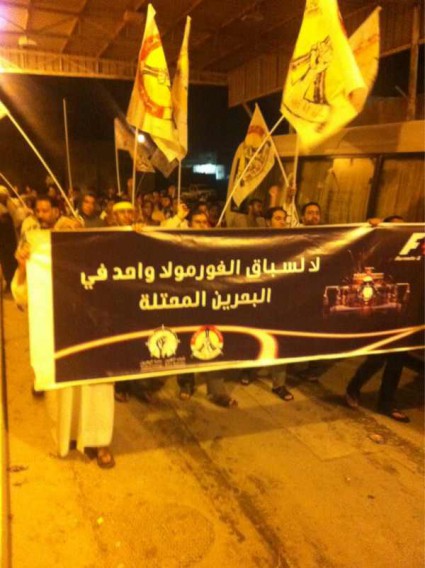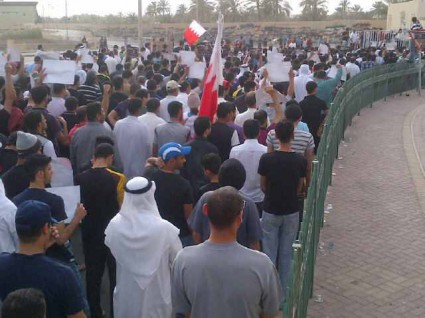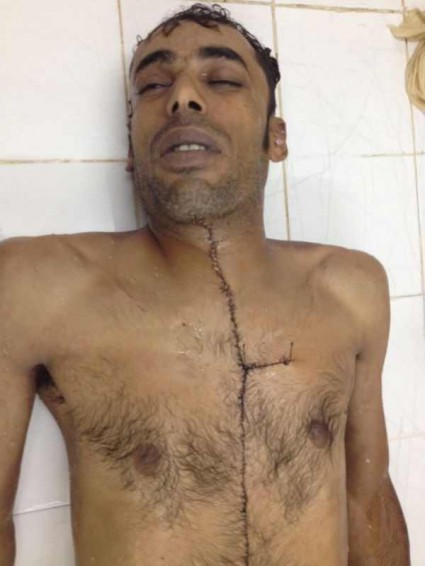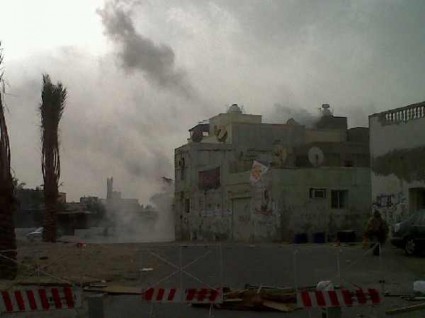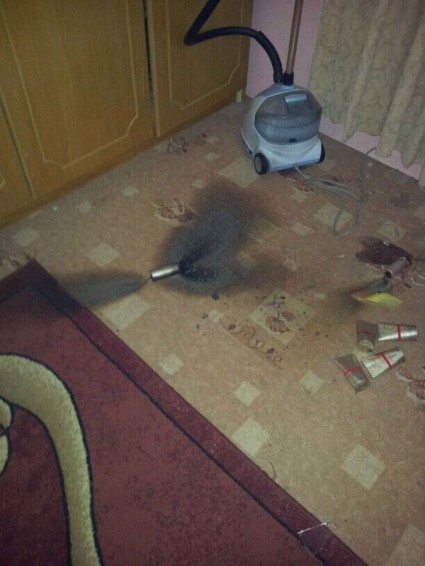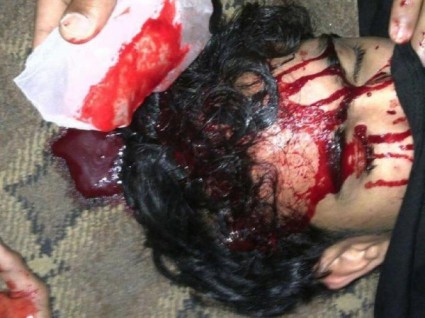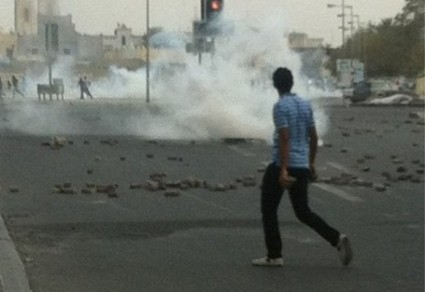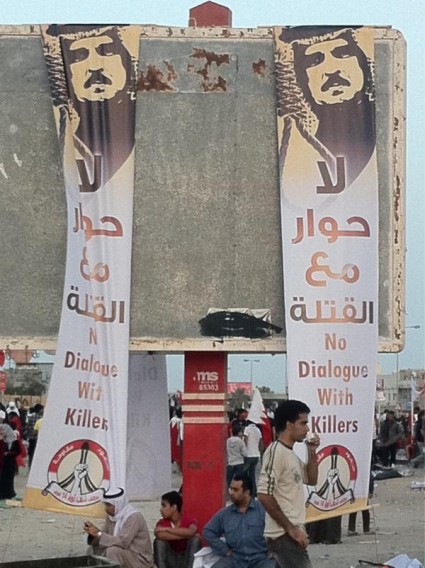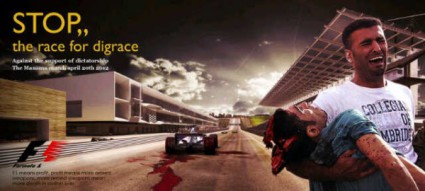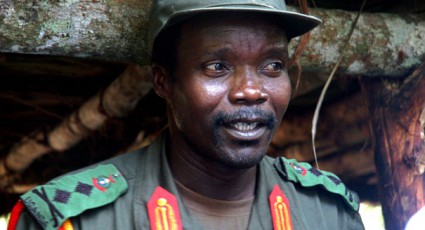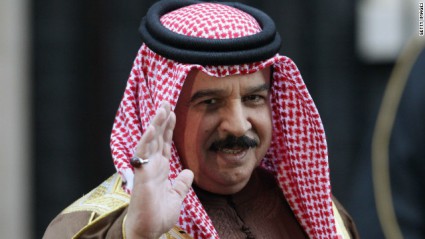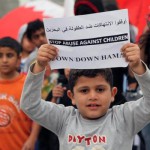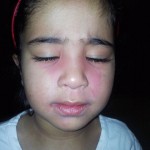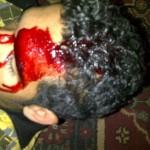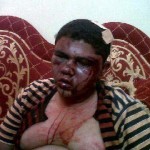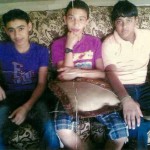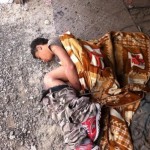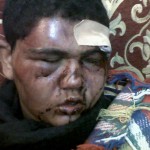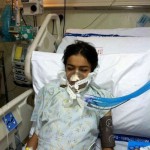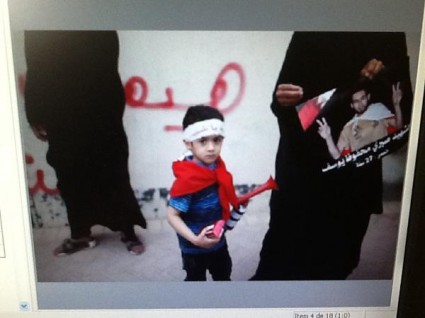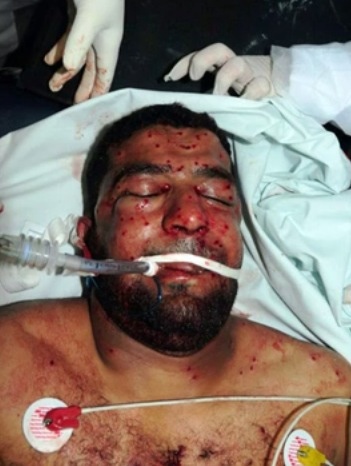Posts from — March 2012
Ministry lies and deception continue to be brought to light regarding Salmaniya
GDN: Minister ‘lied about deaths’
Gulf Daily News- 21 March, 2012
FORMER health minister Faisal Al Hamer allegedly ordered ambulances to stop going to the former GCC (Pearl) roundabout during the unrest, a court heard yesterday.
He also lied about the deaths of protesters during the initial stages of last year’s troubles, according to video footage shown by defence lawyers in the case of 20 medics convicted of carrying out serious offences during the turmoil.
The 50-minute production stated the minister had taken the decision to stop ambulances from reaching the former roundabout based on orders from the Interior Ministry.
It included an interview broadcast on Bahrain TV showing Dr Al Hamer saying there were no civilian deaths between February 14 and February 17.
However, a narrator in the video said four people died during that period.
The video claimed this included one person who died at the former roundabout after ambulances failed to reach injured civilians in time as a result Dr Al Hamer’s orders.
It also showed medics holding rallies at Salmaniya Medical Complex (SMC) calling for the resignation of the former minister, who was removed from his position during a Cabinet reshuffle at the end of February last year.
“This rally was no different from the other pro-government rally held by medics at the SMC in May last year earlier broadcasted on Bahrain TV,” said the narrator.
The video also featured a recording of a call between paramedics and police, which showed authorities ordering ambulances not to go to the roundabout.
“A civilian called for an ambulance to be sent to the roundabout,” said a paramedic. …more
March 26, 2012 No Comments
A documentary on the events at Salmaniya Medical Complex in February and March of 2011
March 26, 2012 No Comments
House of Saud, A Falling House of Cards?
Saudi Arabia: House of Saud, Falling House of Cards
25 March, 2012- Washingtons_Blog – The Market Oracle
Saudi rulers are struggling to contain a new wave of public protests that has erupted across the Arabian kingdom as security forces open fire on unarmed civilians.
The big question: is the House of Saud finally beginning to collapse like the fragile house of cards that this creaking, ruling monarchy represents?
The irony is rich indeed. For the past year, the Saudi rulers have done their utmost to crush the slightest dissent in their country, while at the same time they have backed Western interference, aggression and regime change in Libya and Syria – under the guise, wait for it, of advocating democratic freedom and human rights.
At least two people have been reported dead from Saudi police violence against an outpouring of crowds who have taken to the streets in the kingdom – a female student and a man, described as a well-known human rights activist, are the latest victims. Many others have been injured or arrested as state security forces mobilise in what appears to be a desperate bid by the rulers to contain spreading protests.
The irony is that Saudi Arabia is one of the most vocal members of the Arab League to denounce Syria for alleged human rights violations against protesters in that country. Saudi Arabia’s King Abdullah has even called on Syria’s President Bashar Al Assad to step down and give way to greater democratic reforms.
The irony comes in at least two parts: Saudi’s King Abdullah presides over an absolute monarchy that is brutally suppressing all and any peaceful dissent in his country calling for democracy; and, two, Saudi Arabia is funding and arming subversive groups in Syria who are accused of committing assassinations, kidnappings and many other terrorisms to bring down the secular Assad government.
For the past year, Saudi Arabia – the world’s biggest oil producer and a key Western ally – has witnessed persistent protests against the ruling House of Saud.
Up to now, the demonstrations calling for democratic freedoms have been mainly located in Saudi’s oil-rich Eastern Province, principally in the city of Qatif.
But, most worryingly for US-backed King Abdullah and his entourage of brothers and half-brothers, there is this week growing public dissent in all quarters of the kingdom.
Major street demonstrations are reported in the capital, Riyadh, in the Central Province. Protests are also taking off in the north, such as the city of Ar’ar, the western port of Jeddah and in the southern university city of Abha.
When other Arab countries saw mass protests last year against their dictatorial rulers, Saudi Arabia was also embroiled in the regional ferment. However, Saudi Arabia appeared peripheral to the momentous changes sweeping the Arab region with few media reports of any substantive popular uprising.
This can be explained partly by the ruthlessness of the Saudi authorities in crushing any incipient sign of protest in the kingdom. At least 10 people have been killed over the past year from Saudi state forces attacking peaceful demonstrations. Another explanation for the apparent low-key public protests in Saudi Arabia is the under-reporting of such events by the Western mainstream media.
The popular dissent in Saudi Arabia against its rulers is to be sure there; it is just not being reported by the Western corporate media. That is because Saudi Arabia is a major strategic ally of Western governments, for example in supplying oil, buying huge amounts of weapons, and advancing geopolitical agenda in support of the garrison state of Israel or facilitating the NATO conquest of Libya, hammering Syria, and trying to destabilise Iran. …more
March 26, 2012 No Comments
Stop the Murders in Bahrain – Stop the F1 – Stop King Hamad – Don’t Come!
March 24, 2012 No Comments
82 Bahrainis Murdered by Kingdom of Bahrain, Your Sponsor of the Bahrain Grand Prix – Don’t Come
List of Martyrs of 14Feb revolution in Bahrain to date(14 February, 2011 – 24 March, 2012):
1- Martyr Ali Mushaima – 14 February 2011 – Killed by birdshot in Al Daih
2- Martyr Fadhil Salman Al Matrook – 15 February 2011 – Killed by birdshot during the funeral of martyr Ali Mushaima
3- Martyr Ali Mansoor Khudair – 17 February 2011 – Killed by birdshot during the first lulu attack
4- Martyr Mahmood Abu Taki – 17 February 2011 – Killed by birdshot during the first lulu attack
5- Martyr Ali Mo’men – 17 February 2011 – Killed near Lulu and left to die on the street near Al Gufool traffic lights
6- Martyr Isa Abdul Hussain – 17 February 2011 – Killed by splitting his head open near SMC.
7- Martyr A. Redha Bu Hameed – 22 February 2011 – Killed by live rounds near Lulu
8- Martyr Fadak Mushaima (infant) – 27 February 2011 – Born dead after her mother’s grief on relative martyr Ali Mushaima.
9- Martyr Ali Ebrahim Damistani – 13 March 2011 – Regime thugs chased him near Lulu in his car and he hit a barricade that they set up resulting in death
10- Martyr Ahmed Farhan – 15 March 2011 – Direct shot to the head split his head open in Sitra
11- Martyr Jafar Mohammed Salman – 16 March 2011 – Shot dead in the 2nd lulu attack by army
12- Martyr Ahmed Abdullah Al Arnoot – 16 March 2011 – Killed by birdshot in the 2nd lulu attack
13- Martyr Jafar Abdullah Al Ma’yoof – 16 March 2011 – Killed by birdshot in the 2nd lulu attack
14- Martyr Isa Radhi Al Radhi – 19 March 2011 – Tortured to death in Sitra
[Read more →]
March 24, 2012 No Comments
The money you spend on the Bahrain Grand Prix kills Bahrainis with bullets and lethal gassing – Please Stay Away!
March 24, 2012 No Comments
Bahrainis are dying to bring you the Grand Prix – because King Hamad is having them murdered. DON’T COME!
Two more Murders today as Bahrain’s MOI and US John Timoney perfect the use of tear gas as a lethal weapon
March 24, 2012 No Comments
Bahrain MOI under advice of US, Top Cop John Timoney, hone skills in use of tear gas as lethal weapon
editor: The MOI is responsible for scores of death as a result of abuse of less-than-lethal tear gas intended for use to disperse riotous crowds. Security forces, as a practice use tear gas in deliberate assaults against homes transforming them into gas chambers. MOI Police have established a clear pattern of targeting the sick, elderly and homes with infants. The MOI has a clear practice of “saturation bombing” of villages often at night or in the early morning hours, when people are sleeping or in the day when large protests are occurring leaving the villages more vulnerable to attack.
In the MOI attacks, ransacking homes and theft of personal property and food have become a routine practice. These are not isolated incident these are a daily occurrences and well documented frequent events. The apartheid policies of King Hamad have established that a deadly and systematic collective punishment and genocide has emerged. The al Khalifa regime has ensured the destruction of any remaining hope for the so called “reforms” they have so loudly proclaimed in recent weeks.
The regime reforms are now being seen as clear ploy by the regime, to talk of reform and willingness to “reconcile” but all the while they maintain an intense campaign of collective punishment, escalation of state violence against the opposition, their villages and those least able to defend themselves.
The intensity of lethal nature of these practices have clearly increased under consultation of US, John Timoney and UK, John Yates. When Western governments support “free enterprise murder” unchecked by the Members of Parliament and our Congressional Representatives the moral crisis calls their constituents to hold them accountable. Phlipn.
Tear gas kills two Bahrainis: opposition
AFP, 24 March, 2012
A Bahraini gestures during the funeral of 59-year-old Abda Ali Abdul Hussein in the village of Jidhafds, west of Manama, March 23, 2012. (Photo: Reuters)
Ahmed Abdul Nabi, 31, died after a tear gas grenade landed in his family’s house in the village of Shahrakan, said a statement by Al-Wefaq, citing family members.
The Shiite opposition group said he died due to the “poisoning and asphyxiating gases” used by security forces against Shiite youths, who stage frequent protests against the regime of the Sunni Muslim Al-Khalifa dynasty.
It provided a picture showing a broken window through which the canister is claimed to have entered the house.
Meanwhile, a woman named Abda Ali Abdul Hussein died on Friday after inhaling gases in the village of Jid Hafs, near the Bahraini capital Manama, Wefaq said, again citing family members.
The cause of the deaths could not immediately be confirmed.
Thousands demonstrated on Friday after the Shiite-led opposition called for several simultaneous protests across villages near Manama, in an act of defiance despite a brutal crackdown last March which quelled a month-long uprising demanding democratic change.
The UN High Commissioner for Human Rights on Tuesday criticised Bahraini forces for their “disproportionate use of force” as they sought to quell protests, saying their use of tear gas may have led to over 30 deaths.
“We have been receiving worrying reports of the disproportionate use of force by Bahraini security forces, including the excessive use of tear gas, the use of birdshot pellets and rubber bullets,” said spokesman Rupert Colville. ...more
March 24, 2012 No Comments
Funeral March for Ahmed Abdulnabi killed in Massive MOI Gas attack on Shahrakan
March 24, 2012 No Comments
MOI Police suffocate Ahmed Abdulnabi to death in Shahrakan as Village made into gas chamber
March 24, 2012 No Comments
Bahrain Villages continue under assault transforming many home into gas chambers
March 24, 2012 No Comments
Arguing Salvage of the Unsalvageable – Bahrain Showboat Reform as a meme of Saudi Fascism
U.S. Urged to Leverage Security Cooperation with Bahrain
By David Elkins – 23 March, 2101 – IPS
WASHINGTON, Mar 23, 2012 (IPS) – As government crackdowns continue, Bahrain is attracting more international visitors than just those coming in preparation for next month’s Forumla One Grand Prix.
King Hamad bin Isa al-Khalifa recently hosted Dr. Jimmy Gurulé, a law professor at Notre Dame University and former U.S. assistant attorney general, to “assess the country’s pretrial detention policies and procedures”.
Dr. Gurulé’s delegation, which was sponsored by the American Bar Association and the U.S. State Department, included a visit to Jawa prison, a major detention facility in Bahrain.
The Bahraini government is “in the process of implementing the necessary legislation, the necessary authority of judicial inspections of prisons”, Dr. Gurulé told IPS.
“They are sincere and intent to implement the recommendations of the Bahrain Independent Commission of Inquiry report and intend to implement them fully…the fact that they brought me out suggests that they’re acting in good faith and wanting to implement the recommendations,” he said.
“The most effective way of preventing instances of torture is to ensure that detainees are afforded rights of consul immediately after detention…but there is a dearth of human rights lawyers in the country,” Gurulé said.
Despite reports of increasingly deadly government tactics to suppress protestors and unofficial detention facilities where security forces beat and torture civilians, the Bahraini government has remained, rhetorically, committed to implementing reforms – a claim Western governments, particularly the U.S., seem unwilling to contest publicly.
“(T)he government is taking some actions, but it doesn’t seem to be acting very effectively,” Bill Marczak, a director at Bahrain Watch, a human rights group, told IPS.
“Yes the government issued a police code of conduct on Jan. 30, and set up an Interior Ministry ombudsman, but there are concerns about the independence of the ombudsman, and police still continue the same abuses with impunity.”
A “major non-NATO ally” of the U.S., the Saudi-backed al-Khalifa monarchy has housed the U.S. Navy’s fifth fleet and U.S. Naval Central Command since 1971 – the base for most of the U.S. naval operations in the Persian Gulf as well as the U.S. war in Afghanistan.
Of primary concern for U.S. policy makers are strategic and political rivalries between Saudi Arabia and Iran – however exaggerated or understated these rivalries may be – as well as regional security issues, according to some experts.
“The vast majority of connection and effort and diplomacy has been between through the White House and the Pentagon…that is significant because it means that the security architecture is how it gets it leverage,” Dr. Toby C. Jones, a professor of modern Middle East History at Rutgers University told IPS.
“But it can be argued that that leverage has not been used effectively,” Jones added.
Saudi Arabia, which has largely avoided the popular demands for political change in the region, has a large interest in preventing religious and ethnic tensions in Bahrain from spilling over into its eastern provinces that serve as major hubs for oil production and transportation – tensions that the Saudi monarchy has attributed to Iranian machinations. …more
March 23, 2012 No Comments
Bahrain MOI Police transform village home into deadly Gas Chamber using less-than-lethal CS Gas
March 23, 2012 No Comments
Gas claims another life in A’ali as Bahrain MOI transforms Villages into Gas Chambers
Bahraini woman dies from inhaling tear gas fired by regime forces
23 March, 2012 – PressTV
The victim, identified as Abde Ali, aged 59, died on Friday after she inhaled tear gas fired by Saudi-backed Al Khalifa regime forces at protesters in the A’ali village, situated about three kilometers (1.8 miles) southeast of the capital, Manama.
The development comes a day after security forces used tear gas and rubber bullets to disperse anti-government protesters in several towns and villages outside Manama.
The protesters were chanting slogans against the regime, demanding the ouster of its rulers.
Meanwhile, Bahraini activists have released new footage showing a handcuffed child who, they said, was beaten and sexually harassed by the Saudi-backed forces.
The boy was left unconscious with his hands tied behind his back and was found lying in a street by residents in the Sanabis village near Manama.
Bahrain has been witnessing a revolution since anti-government protests broke out in February 2011.
Forces loyal to the Al Khalifa ruling family have ever since killed scores of protesters and arrested thousands more. …more
March 23, 2012 No Comments
King Hamad gives “green light” for 2012 F1, says, “we’ve been preparing for this all year”
March 23, 2012 No Comments
MOI Police make lethal use of less-than-lethal weapons in Karranah
March 23, 2012 No Comments
Gassing the Masses in Bahrain as another day of protest and dissent sweeps the country
Police target thousands of protesters with tear gas across Bahrain
23 March, 2012 – BlottR
Police riots fired tear gas to disperse a huge rally in Sitra, an island in the Central Governorate of Bahrain. According to S.Yousif Almuhafda, a human rights defender, thousands of protesters demonstrated to demand the overthrow of the regime.
Besides Sitra, 9 other marches were organised across the kingdom today. People protested in Sanabis, Al-Dair, Aali, Tubli, Bilad, Samaheej, Bilad Alqadim, Karzakan and Nuwaidrat as well as in neighbouring villages. According to Maryam Al-Khawaja, a prominent activist, each of these protests were attacked by security forces and dispersed with large amounts tear gas.
Activists reported a heavy presence of security forces with armoured vehicles and jeeps roaming around many villages. Violent clashes also erupted between protesters and police forces in different areas, young demonstrators retaliated throwing rocks at police officers including in Sitra.
On twitter protesters reported that police attempted to run them over, one tweeted: “Just escaped from SUV almost ran over us”. Others said on their twitter account: “And as I expected: it is raining #teargas outside! #Bahrain10Marches #Bahrain”
As the protests terminated activist Al-Khawaja sent a tweet saying: “Several residential areas facing collective punishment right now bcz of earlier protests #bahrain #feb14 #dailyoccurrence”.
This wave of violence comes as the Bahraini Kind claimed “significant and broad progress” toward reforms in a report following up earlier recommendations to correct widespread abuse committed during the government’s crackdown on pro-democracy protests last year.
Since the beginning of the uprising 13 months ago, activists claim that 70 people have died across Bahrain due to abuses committed by security forces and the use of tear gas. …more
March 23, 2012 No Comments
No Dialogue with Killers
Saudi Arabia “reaching out to Bahrain opposition”
22 March, 2012 – World Bulletin
The leading Shi’ite opposition party Wefaq was involved in backroom talks during a pro-democracy uprising last year on reforms offered by Crown Prince Salman, but the they were cut short when Saudi troops rolled in and martial law was imposed.
Saudi Arabia wants Bahrain’s government and opposition to resolve a political crisis that it fears could worsen because of the sectarian fallout of fighting in Syria and destabilise its Eastern Province, a diplomat and opposition politician said.
Bahrain has been in turmoil since the Arab Spring protest movement first erupted a year ago. Clashes have become a daily occurrence, usually in districts populated by majority Shi’ite Muslims who have dominated the protests.
“We heard that at end of January the Saudis were reaching out to Wefaq and wanted to hear how Wefaq – if Act 1 was last year – how they were going to play their role in Act 2,” a senior Western diplomat said.
The leading Shi’ite opposition party Wefaq was involved in backroom talks during a pro-democracy uprising last year on reforms offered by Crown Prince Salman, but the they were cut short when Saudi troops rolled in and martial law was imposed.
The revolt was led by Shi’ite Muslim majority population on an island which is important to Washington as the base for the U.S. Navy’s Fifth Fleet.
The Shi’ite majority has called for sweeping democratic reforms that would reduce the Sunni ruling family’s monopoly on power and allow parliament real powers to legislate and form governments.
One year on clashes between riot police and youths in Shi’ite districts have escalated, with heavy use of petrol bombs against police who in turn use large amounts of tear gas. Activists say at least 32 have died since martial law ended, though police question the causes of death.
In January Wefaq members met with Royal Court Minister Khaled bin Ahmed for preliminary discussions on a formal dialogue on democratic reforms.
The diplomat said Wefaq, which faces radicalisation among many Shi’ite youth who oppose the monarchy, had met for a second time with the minister in recent weeks.
“There is stuff going on but it’s getting more difficult than they imagined it would be. They are finding it difficult to get common ground,” he said, citing government fears that Wefaq would command a parliamentary majority.
“You can foresee a political solution here that would keep the Saudis very happy, but I think the red lines would be slightly tighter than last year,” he added.
Analysts say Riyadh sent troops last year because of alarm that Bahrain had not contained protests that had the potential to spill over into the Shi’ite Eastern Province region, where major Saudi oilfields are located.
An opposition politician, who did not wish to be named, said Saudi Arabia now feared that the conflict in Syria could sharpen Bahrain’s sectarian divide – detracting attention from Syria and firing up Saudi Shi’ites.
“The Saudis are worried (the stalemate) could push the Shi’ites towards Iran… and at what could emerge as a consequence of Syria,” he said. …more
March 22, 2012 No Comments
Stop Bahrain’s F1 “Race of Disgrace” – Don’t Come
March 22, 2012 No Comments
Seamless Integration of Tyrany and Deceit – al Khalifa and al Saud
The opposition in Saudi Arabia is calling for democratic and social reforms – but the movement is ignored by the international media and Western governments.
Saudi Arabia: protests in the centre of counter revolution
22 March 2012 – by Joseph Daher – Counter Fire
Thousands of students at the all-female King Khaled University in Saudi Arabia boycotted classes last week to protest against poor services and demand reform. Following the suppression of the demonstrations, protests have spread to a number of cities in Saudi Arabia. The anger of students spread and gone beyond the city of Abha to larger parts of the Kingdom, where several protests took place in the cities of Riyadh, al-Namas, Ar’ar, Qatif and al-Rabeeah.
Saudi authorities responded to the protests with violence, killing one female student and injuring 54 others.
In Taibah University in the city of Medina, one student was expelled for publicly criticising the deteriorating conditions on campus during an open meeting with the director. In the eastern province of Qatif, one civilian was killed and several injured after security forces clashed with protesters demanding political reform.
The Ministry of Interior released a statement in which it vowed to address ‘acts of terrorism’ and described the protesters as ‘a deluded minority.’
Protests started with the self-immolation of a man in Samtah, Jizan, on 21 January 2011 and demonstrations of a few hundred people in late January in Jeddah and throughout February and early March in the cities of Qatif, al-Awamiyah, Riyadh and Hofuf.
In April 2011, several small protests over labour rights took place in front of government ministry buildings in Riyadh,Ta’if and Tabuk. Protests continued in late March and April in Qatif and smaller cities in the Eastern Province such as al-Awamiyah, and Hofuf, which are majority composed of Saudi Shia citizens who are discriminated by the authorities because of their religion.
The protestors called for the release of prisoners, the withdrawal of the Peninsula Shield Force from Bahrain and equal representation.
Uprisings have continued in the Qatif region. During protests in May, October and November, police shot live ammunition at protestors calling for the Eastern Province to have its own constitution and legislative assembly, and for the Society for Development and Change to be legally registered. The protests continued in December in Riyadh and Buraidah, calling for the release or trial of prisoners. …more
March 22, 2012 No Comments
King Hamad’s Apartheid in Bahrain
March 22, 2012 No Comments
STOP BAHRAIN CHILD ABUSE AND MURDER – STOP KING HAMAD
US CONGRESS VOTED NOT TO LET JOHN KONY GET AWAY WITH CHILD ABUSE AND MURDER
BUT THE US CONGRESS WON’T STOP KING HAMAD AND PRESIDENT OBAMA CALLS HIM FRIEND
NO MORE VICTIMS – HAMAD MUST GO – INSIST UPON IT
March 22, 2012 No Comments
Hope lights the path of the Revolution
March 22, 2012 No Comments
Ali Hashem Al Jazeera Journalist Explains Resignation over Syria and Bahrain Coverage
Al Jazeera Journalist Resigns over Syria and Bahrain Coverage
by grtv
Ali Hashem: Al Jazeera has become a “media war machine” and is “committing journalistic suicide”.
In the middle of February, something called the Syrian Electronic Army—hackers in Syria that support the government—hacked into Al Jazeera’s servers and found some emails. Some of them were written by Ali Hashem, who was a Middle East correspondent for the Arab Al Jazeera channel. In those emails he expressed his concern about the way Al Jazeera was covering the conflict in Syria. It later led to his resignation.
Ali Hashem is a television journalist who recently resigned from his post as a war reporter for Al Jazeera. While working for Al Jazeera, he covered the revolution in Libya, Lebanese politics, and tension related to the Syrian uprising on the Syrian Lebanese borders. He also worked for the BBC and led the production team at Manar TV. …source
March 22, 2012 No Comments
King Hamad Free Jafer Salman Maki Now!
Jafer lost one of his eyes due to a birdshot and he’s about to lose his second eye of not treated ASAP. #FreeJafer #bahrain
March 22, 2012 No Comments

